Why You Should Want Condos Approved by The FHA
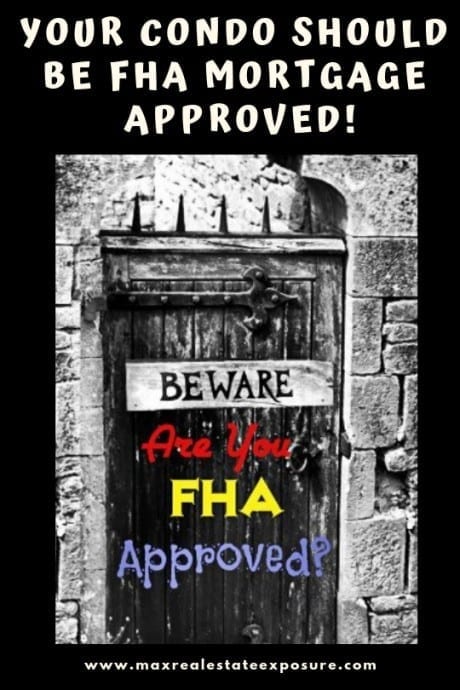
Have you ever heard of FHA condo approval and wondered what it meant? If so, you’re not alone.
What should buyers and sellers know about FHA condo approval requirements? Plenty!
First and foremost, you should know that having FHA condo approval is vital.
If you can get one, an FHA loan is an excellent way to pick up a condo or townhome in today’s real estate market.
However, both condo buyers and sellers are often unaware of everything that goes into the FHA loan process and how difficult it can be to land an FHA loan on a condominium.
The bar is set high, and buyers and sellers should educate themselves on the FHA process.
For sellers, a condo with FHA approval is to be more marketable to prospective buyers. Buyers can use these low-down payment loans when the community is on the FHA condo approval list.
After reading, you’ll understand why FHA condo approval is vital.
A condo project without being FHA-approved can suffer greatly.
Condominium buyers are forced to get conventional loans, eliminating a significant financing option.
The impact can certainly be felt from many years of experience selling condos, especially with first-time buyers who count on the ability to get an FHA home loan.
What is an FHA Loan?
For those unfamiliar with the term FHA loan, it stands for the Federal Housing Administration.
Essentially, it is a government-backed loan that allows those borrowers who have not saved a substantial amount of money but otherwise have good credit and stable employment to get financing.
The FHA is one of the first options for getting a bad credit loan. The minimum credit score is lower.
Perhaps the most significant attraction of FHA financing is that FHA borrowers only need a down payment of 3.5% of the purchase price.
Any real estate agent who has been in the business long enough can tell you just how popular this type of financing can be.
Without FHA certification, selling a condo can be much more challenging, as you soon discover. Borrowers should know one drawback to this type of loan: paying FHA mortgage insurance.
Unlike traditional mortgages, there are two types of mortgage insurance. Condo buyers will pay an upfront fee of 1.75% of the loan amount in addition to an annual fee that ranges from .45%-1.05%. With this fee, your mortgage payment will be higher.
PMI (private mortgage insurance) also affects your monthly payments with traditional mortgages when you don’t have a twenty percent down payment.
For this reason, it’s essential to get rid of it as soon as possible.
What is an FHA-Approved Condo?
An FHA-approved condo can be either an entire community or a single unit. Units approved for FHA financing will have been appraised and include a condo ID number.
Before 2019, an entire community had to be approved for the FHA condo approval list. That is no longer the case; individual units can be spot-approved.
Vital Facts to Know
1. FHA Condo Approval is a process that allows condominium projects to become eligible for Federal Housing Administration (FHA) financing.
2. FHA-approved condos are essential because they expand the pool of potential buyers who can purchase a condominium using an FHA loan.
3. To obtain approval, a condominium project must meet specific eligibility criteria the FHA sets, such as having a certain percentage of owner-occupied units and maintaining proper insurance coverage.
4. Once a condominium project receives FHA Condo Approval, individual unit owners may be eligible to apply for FHA-insured mortgages.
5. The approval process helps provide affordable housing options to more people by making it easier for them to finance the purchase of a condominium.
6. The FHA condominium approval process has a success rate of 80%, with most applications approved by lenders.
Why Approval is Vital For Sellers
As a seller, you may wonder why a condo should get FHA-approved. The answer is simple – you want to achieve the maximum return on your investment!
Having FHA mortgage approval increases the odds that selling your condo will happen quickly and for a price at least around the average market value – hopefully above that.
However, this is challenging, as anyone who has sold condos can tell you. The condo market can be more fickle than most, and you can find yourself in a difficult situation if you do not remain aware of how the market works.
As a condominium seller, having your neighborhood approved for FHA financing is critical.
Without FHA approval on your condominium, you lose the potential of a substantial amount of buyers who otherwise would not have the down payment necessary to purchase.
Never underestimate the importance of having an FHA-approved condo!Click To TweetCheck on Whether Your Condo is FHA Approved Before Selling
I can remember not that long ago while doing my due diligence for a condo complex in Milford, Massachusetts, the condominium owner thought that they were FHA approved.
While double-checking on this, it was discovered that the condominium association allowed the approval to lapse.
After hearing me explain what a detriment this was to her property value and everyone else who lived there, the owner decided it made perfect sense to get re-instated.
Of course, she had to convince those on the homeowners association that doing so was well worth the money.
Luckily for her, she was able to persuade them. This was a case of a condo association putting their collective heads together and realizing that being on an FHA-approved list was extremely important.
Why Condo Approval Matters
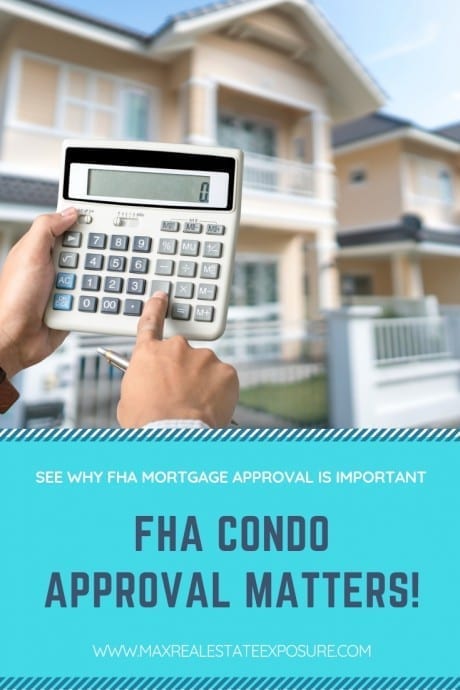 When your condo complex meets FHA requirements, it automatically opens your sale to many buyers.
When your condo complex meets FHA requirements, it automatically opens your sale to many buyers.
Home buyers with lower down payments want to own a home and can do so with an FHA-approved loan.
Having FHA approval matters to you because, without FHA condo approval, your property remains unavailable to many ready and willing buyers to give you the money you want for your home.
With an FHA loan, a buyer can purchase a condo with only a 3.5% down payment. This is significant because many customers have high incomes but have not saved a substantial down payment.
An FHA mortgage allows them to purchase with a lower down payment than most conventional mortgages.
What Are The Requirements For Approval?
FHA approval matters for another reason as well. Even if your buyer has an infinite amount of income, it will likely not fetch as high of a value as those that do if your condo complex does not meet FHA requirements.
The reasons for this are straightforward.
For the most part, FHA demands are reasonable requirements, things that any good investor would want from their property.
Demanding secure homeowners, decent cash reserves for the association, and a sound legal situation are all reasonable, especially considering dropping large sums of money towards a particular purchase.
You want your condo and complex to meet these requirements, especially if you want to get top value for your property. It may be a cumbersome process, but it will be well worth it if you plan on selling for top dollar.
To have FHA-approved condos, the following requirements must be met:
- Only ten percent of the units in a condominium complex with ten or more units can be FHA-insured. A condo building with less than ten units can only have two units with an FHA loan.
- Fifty percent of the units must be owner-occupied.
- Eighty-five percent or more of the individual units must be current on their condo association dues.
- The condo project must have proper insurance and have at least 10 percent of the HOA budget in cash reserves.
- Not more than 35 percent of the project can have commercial space.
- For the condominium project approval to remain current, it must be recertified every three years. The recertification process will include an FHA review.
The eligibility requirements must be maintained, or condo communities will lose their approval.
Are you beginning to realize why you should get a FHA-approved condo? Following FHA condo loan rules is worth it!
Difficult FHA Standards
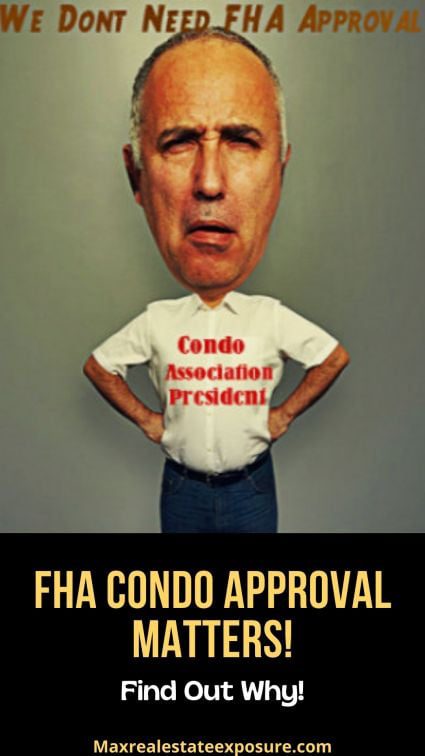 Remember that a decent percentage of condo complexes do not meet FHA requirements.
Remember that a decent percentage of condo complexes do not meet FHA requirements.
Some have never applied for FHA approval, and others have let the approval lapse.
From a homeowner’s perspective, this is not something you ever want to let lapse. Unfortunately, condos are not like single-family homes where you rule the roost.
You are governed by a majority of people making decisions on your behalf.
While you may have a voice, sometimes it is easy for things to fall through the cracks, and you may be aware that your neighborhood is no longer FHA-approved.
Sometimes, the folks running an association do not fully understand how much this approval can affect market values.
Then again, you could be caught in a situation where a few thick-headed people running the show are clueless.
You know the type – they sit around all day thinking up new rules and regulations to feel self-important and make others miserable.
Approval is Less Important in Hot Seller’s Markets
You can sell a condo that does not meet FHA requirements. However, like any other property that is not perfect, you must rein in your expectations on how much you can get and how quickly you can unload it.
When the housing market is on fire, and there are numerous bidding wars, it won’t matter nearly as much.
However, having a condominium unit with FHA approval could be important when market conditions change in a buyer’s real estate market.
Condo owners will have to find a buyer who does not need an FHA loan and is not as picky about the property they purchase.
Your condo may have many renters – something the FHA does not like – or it may have a problem with homeowners who are late on their payments to the association. Or, you may be unlucky enough to be in a situation with ongoing litigation against your organization.
If your association falls into any of these problem areas, you may still be able to sell your home. However, it may not command top dollar, and you should be prepared for this.
It may be best to do so if you can wait until the problem is resolved, such as with delinquent homeowners’ association fees. If you want top dollar, you should seek FHA approval.
Go ahead and explain to the board members why this is so crucial. Show them this article to understand its importance to their property value!
Why It Matters For Buyers Matters
There are many reasons to choose an FHA-approved condo, not the least of which is the possibility of a small down payment loan.
FHA approval requires adherence to some quality control requirements that few associations can meet.
National Mortgage News claims that approximately 60 percent of associations are denied approval from the FHA, a thorough vetting process that cuts no corners in its demands on condo associations.
The FHA only wants to loan money on properties considered a sound investment, and these requirements are deemed necessary to guarantee such investments reasonably.
By purchasing a condo that is eligible for an FHA loan, you have allowed the government to do much of the work to guarantee your investment.Click To TweetKnowing The Association is Financially Stable is Essential
Not only have you managed to get a good loan towards your purchase, but you have also ensured that most people living in your condo association will be owners and current on their association dues.
Perhaps even more essential, you will guarantee that your condo association has reserves of cash that are at least equal to a year’s worth of fees from the association.
When something goes wrong that affects the whole complex, such as roofing issues or flooding problems, your association will have the money to address those problems.
As a bonus, your association is guaranteed to be free of legal problems at the time of your purchase. When you have invested with numerous other individuals in a property, this can make a big difference.
When any buyer is considering purchasing a condo, they should ask some important condo questions beforehand. Finding out the answers to these issues can save a lot of heartburn somewhere down the road.
While there is a natural progression from some who have owned single-family homes to opt for condominium living, they often forget how different it will be when they are no longer king of their castle.
How to Get FHA Approved
Many potential buyers and sellers will ask about the FHA condo approval process.
Now that you know why it is crucial to have FHA condo approval, let’s review the process for getting a condominium project approved.
If you are an FHA buyer wanting to finance or get a reverse mortgage within the condominium association, the entire development will be to have FHA approval.
The process will start by gathering the documents the FHA needs to approve.
For condominium communities to obtain FHA loan approval, they must go through either the HUD Review and Approval Process (HRAP) or the Direct Endorsement Lender Review and Approval Process (DELRAP) for lenders.
The length of the approval process is contingent upon the original structure of the condominium complex. The approval timeline may be extended if the property is older and has many unique features.
Upon approval through HRAP or DELRAP, the condo community is assigned a condo ID and submission number, which makes it eligible to receive FHA-insured loans.
 Documents Needed For The Condominium Approval Process
Documents Needed For The Condominium Approval Process
- The recorded covenants, conditions, and restrictions.
- Adopted bylaws signed and dated by board members.
- Articles of incorporation filed with the state.
- A copy of the current budget.
- A recent income statement and balance sheet
- An income statement or audit from the prior year.
- The current insurance policy includes hazards and liability.
- Fidelity bond declaration, aka employee dishonesty policy.
- A signed management company agreement unless self-managed.
- The list of rented units in the condo community.
How Much Does The Approval Cost?
The cost of getting an entire complex certified depends on the following:
- A condominium that has never been approved will cost $850.
- A condo that has expired approval over six months will also cost $850.
- Condos that are not passed expiration but will be up for renewal soon will cost $765.
- An expired condo for less than six months will also cost $765.
- New construction units less than a year old will cost $1500.
As you can see, the cost of FHA condo approval can vary, so it is essential to check the current status.
How Long Will It Take to Get Approved?
The time frame to get FHA condo approval is usually around two to four weeks. A significant factor will be how quickly the property manager or condo association returns the required documents.
The current eligibility of the condo community and the current workload of the FHA will also be factored into the timeliness of the approval.
The process should be started immediately so the time to close is not impacted.
How Long Will Approval Last?
FHA certifications last for three years. During this time frame, condo buyers can get an FHA-insured loan for purchasing or refinancing.
A reverse mortgage or HECM loan will also be possible.
What Happens When an Approval Expires?
If the community FHA approval expires, it must undergo recertification. The FHA condo approval process will likely need to be completed before the condo can close.
How to Renew an Approval?
To get a condo recertified, it must undergo the HUD review and approval process. Once the condo project is recertified, the approval will be suitable for three years.
Approval needs to be renewed because the status of the condos and their occupants can change.
For example, things such as owner-occupied vs. investor ratios can change. The budget can change. The number of owners who have not paid their condo dues could have changed.
These are just a few examples of why condominium recertification is needed.
What is The FHA Condo Approval List?
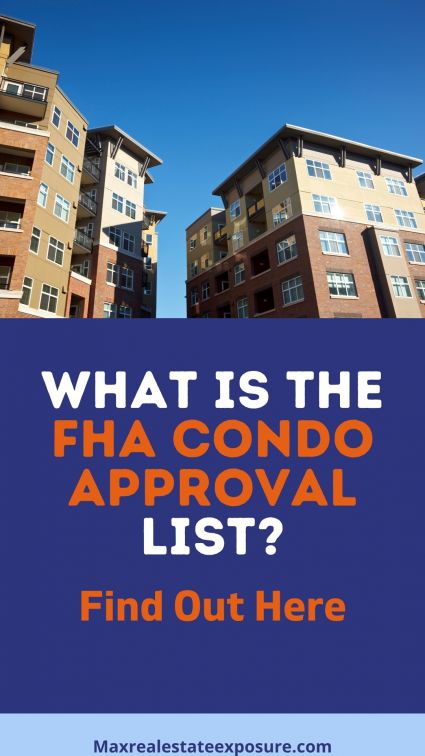 The FHA condo approval list documents the condominium projects the FHA has approved.
The FHA condo approval list documents the condominium projects the FHA has approved.
With approval, FHA condominium loans can purchase any individual condo unit.
FHA Condominium Approval LookUp
The list of FHA-approved condos can be found by visiting the HUD website. This is the official site for determining FHA eligibility.
The loan officer or lender you are working with should also be able to assist.
Determining the approval status upfront will be essential as a borrower, so you’re not wasting time.
Homebuyers or their agents should look up whether the condominium projects they are interested in meet the guidelines and criteria. Having the condo name, city, and zip code will be helpful in determining the housing eligibility.
What is Single-Unit Approval?
Years ago, you could get spot approval on a single condo unit in a condo project that did not have FHA approval.
Today, it has been replaced by what’s known as an FHA condo unit spot approval.
Spot approval loans are available for those who qualify.
The FHA spot approval program allows a borrower to get financing without the condo project obtaining FHA certification.
Even though the HOA doesn’t have to get FHA approval under the program, it still must qualify.
The FHA condominium loan-level single-unit questionnaire must be filled out to get single-unit condo approval. The documents are known as questionnaire HUD-9991.
The U.S. Department of Housing and Urban Development oversees the single-unit approval process.
To qualify, the condo must be in a project that isn’t FHA-approved, complete, and ready to be occupied. The project must have five or more units and not be manufactured homes.
The Federal government has made this kind of financing easier with the FHA single-unit approval program.
What About VA Loans?
You may be wondering if there are also approval requirements for a VA loan. The answer is yes. A while ago, the FHA and VA had a reciprocal approval agreement. That is no longer the case.
The Department of Veteran Affairs will review condo docs and bylaws to investigate potential conflicts. The goal will be to ensure veterans are not buying into overly restrictive projects that will make selling difficult.
The following should be understood about VA loan approval for condos:
VA condo approval is not the same and is separate from FHA. It typically takes around 40 days to get VA condo approval. The cost is 850.
VA condo approval will not expire – it’s a lifelong approval.
Pros and Cons of FHA-Approved Condominiums
A final review of the pros and cons of condos with FHA loan approval includes the following:
Pros
- Low down payment requirements
- Lower credit score requirements compared to conventional loans
Cons
- FHA loans have minimal property condition requirements. Here are the inspection requirements for FHA loans.
- Paying for mortgage insurance is a requirement
- Condo communities need to be recertified every three years
- Not all condo projects have FHA approval
FAQs
Here are some common questions and their answers.
What Happens If A Condo I Like Does Not Meet The Requirements?
If a condo does not meet the requirements for FHA approval, there are several potential outcomes. It is essential to note that FHA approval is not mandatory for condos, but it can significantly benefit buyers and sellers regarding financing options.
If the housing fails to meet the requirements, it may limit the pool of potential buyers who rely on FHA loans. However, this does not mean that the condo cannot be sold or financed through other means.
Alternative financing options, such as Fannie Mae or Freddie Mac loans or cash purchases, can still be utilized. Additionally, the condo association or management may choose to address the issues that prevented FHA approval and reapply in the future.
Where Can I Find a Lender Who Offers FHA Financing For Condos?
Several reliable options are available when finding a lender who offers FHA financing for condos. One of the best places to start your search is by visiting the official website of the Federal Housing Administration (FHA). They maintain a comprehensive list of approved lenders offering FHA financing for various properties, including condos.
You can also contact local banks and credit unions in your area, as they often partner with FHA-approved lenders. Another valuable resource is online mortgage marketplaces that connect borrowers with multiple lenders, allowing you to compare different options and find the one that suits your needs.
Remember to carefully review each lender’s terms and conditions to ensure they align with your requirements and financial situation.
Final Thoughts
The endorsement of the FHA for condo associations matters, both to buyers and sellers. If you are selling, you want top dollar for your property. If you are a buyer, you want the best you can buy for the money.
FHA certifications guarantee both of these and should be a priority for buyers and sellers. Hopefully, you have concluded that FHA condo approvals matter to buyers and sellers!
More Helpful Resources
- What are the benefits of an FHA loan – See why FHA is such a terrific loan program.
- A guide to understanding all there is to know about FHA loans by HUD.GOV.
Use the additional resources to learn why having an FHA-approved condo is essential!
About the Author: Bill Gassett, a nationally recognized leader in his field, provided information on FHA condo approval. He is an expert in mortgages, financing, moving, home improvement, and general real estate.
Learn more about Bill Gassett and the publications he has been featured in. Bill can be reached via email at billgassett@remaxexec.com or by phone at 508-625-0191. Bill has helped people move in and out of Metrowest towns for the last 38+ years.
Are you thinking of selling your home? I am passionate about real estate and love sharing my marketing expertise!
I service Real Estate Sales in the following Metrowest MA towns: Ashland, Bellingham, Douglas, Framingham, Franklin, Grafton, Holliston, Hopkinton, Hopedale, Medway, Mendon, Milford, Millbury, Millville, Natick, Northborough, Northbridge, Shrewsbury, Southborough, Sutton, Wayland, Westborough, Whitinsville, Worcester, Upton, and Uxbridge MA.


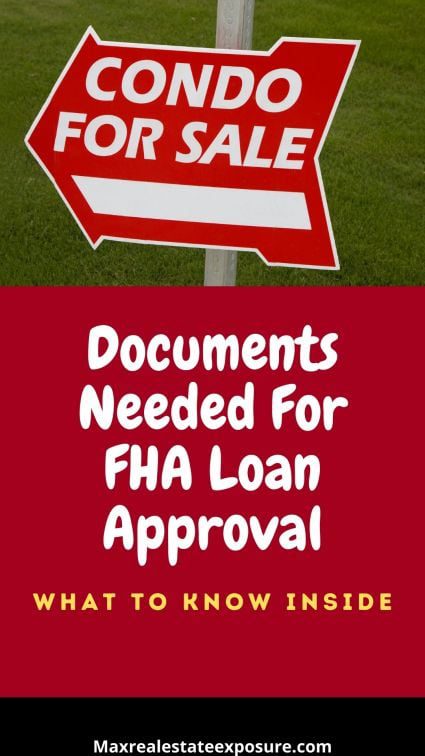 Documents Needed For The Condominium Approval Process
Documents Needed For The Condominium Approval Process